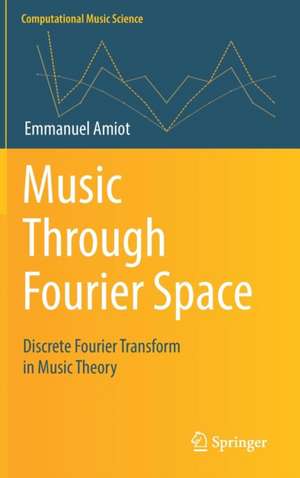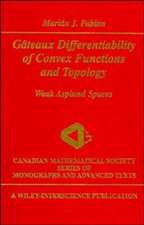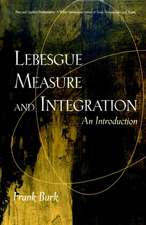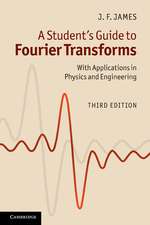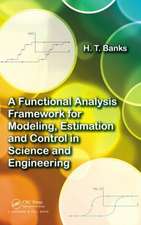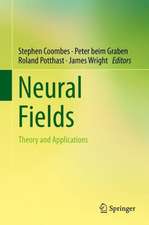Music Through Fourier Space: Discrete Fourier Transform in Music Theory: Computational Music Science
Autor Emmanuel Amioten Limba Engleză Hardback – 4 noi 2016
This is the first textbook dedicated to this subject, and with supporting examples and exercises this is suitable for researchers and advanced undergraduate and graduate students of music, computer science and engineering. The author has made online supplementary material available, and the book is also suitable for practitioners who want to learn about techniques for understanding musical notions and who want to gain musical insights into mathematical problems.
| Toate formatele și edițiile | Preț | Express |
|---|---|---|
| Paperback (1) | 328.79 lei 43-57 zile | |
| Springer International Publishing – 16 iun 2018 | 328.79 lei 43-57 zile | |
| Hardback (1) | 505.81 lei 43-57 zile | |
| Springer International Publishing – 4 noi 2016 | 505.81 lei 43-57 zile |
Din seria Computational Music Science
- 24%
 Preț: 913.53 lei
Preț: 913.53 lei - 18%
 Preț: 726.85 lei
Preț: 726.85 lei - 20%
 Preț: 596.63 lei
Preț: 596.63 lei - 20%
 Preț: 589.20 lei
Preț: 589.20 lei -
 Preț: 388.13 lei
Preț: 388.13 lei - 15%
 Preț: 648.05 lei
Preț: 648.05 lei - 20%
 Preț: 326.32 lei
Preț: 326.32 lei - 20%
 Preț: 333.04 lei
Preț: 333.04 lei - 20%
 Preț: 335.52 lei
Preț: 335.52 lei - 20%
 Preț: 308.98 lei
Preț: 308.98 lei - 20%
 Preț: 597.29 lei
Preț: 597.29 lei - 20%
 Preț: 504.98 lei
Preț: 504.98 lei - 20%
 Preț: 940.47 lei
Preț: 940.47 lei - 24%
 Preț: 745.83 lei
Preț: 745.83 lei - 24%
 Preț: 612.93 lei
Preț: 612.93 lei - 20%
 Preț: 501.20 lei
Preț: 501.20 lei - 20%
 Preț: 533.76 lei
Preț: 533.76 lei - 18%
 Preț: 725.92 lei
Preț: 725.92 lei - 15%
 Preț: 579.99 lei
Preț: 579.99 lei -
 Preț: 487.96 lei
Preț: 487.96 lei - 18%
 Preț: 1116.26 lei
Preț: 1116.26 lei
Preț: 505.81 lei
Preț vechi: 632.26 lei
-20% Nou
Puncte Express: 759
Preț estimativ în valută:
96.82€ • 105.20$ • 81.38£
96.82€ • 105.20$ • 81.38£
Carte tipărită la comandă
Livrare economică 21 aprilie-05 mai
Preluare comenzi: 021 569.72.76
Specificații
ISBN-13: 9783319455808
ISBN-10: 331945580X
Pagini: 209
Ilustrații: XV, 206 p. 129 illus., 45 illus. in color.
Dimensiuni: 155 x 235 x 14 mm
Greutate: 0.49 kg
Ediția:1st ed. 2016
Editura: Springer International Publishing
Colecția Springer
Seria Computational Music Science
Locul publicării:Cham, Switzerland
ISBN-10: 331945580X
Pagini: 209
Ilustrații: XV, 206 p. 129 illus., 45 illus. in color.
Dimensiuni: 155 x 235 x 14 mm
Greutate: 0.49 kg
Ediția:1st ed. 2016
Editura: Springer International Publishing
Colecția Springer
Seria Computational Music Science
Locul publicării:Cham, Switzerland
Cuprins
Discrete Fourier Transform of Distributions.- Homometry and the Phase Retrieval Problem.- Nil Fourier Coefficients and Tilings.- Saliency.- Continuous Spaces, Continuous Fourier Transform.- Phases of Fourier Coefficients.
Recenzii
“This book is a short exposition of important material in the field of mathematics and music. It describes a number of topics to which Amiot has contributed significant research. ... This book should prove to be a real delight for aficionados of mathematics and music. It contains a wealth of important material and is certain to drive further investigations in this fascinating interdisciplinary field.” (James Stephan Walker, Mathematical Reviews, June, 2018)
“Amiot’s nice book gives the state of the art in the usage of DFT of abstract musical structures such as rhythms, scales, chords, pitch class distributions, and so on. … This is possibly the first textbook on the topic. … The target readership includes graduates and advanced undergraduates of computational music science and engineering. Researchers in music should also find it of interest.” (Soubhik Chakraborty, Computing Reviews, May, 2017)
Notă biografică
Emmanuel Amiot teaches mathematics at the Lycée François Arago in Perpignan, he is a researcher in the Laboratoire de Mathématiques et Physique (LAMPS) of Université de Perpignan Via Domitia, and he is a regular collaborator with researchers at the Institut de Recherche et Coordination Acoustique/Musique (IRCAM), Paris. He is a pioneer of the techniques described in this textbook, with considerable research and teaching experience in the related areas, geometry, topology, and applied mathematics.
Textul de pe ultima copertă
This book explains the state of the art in the use of the discrete Fourier transform (DFT) of musical structures such as rhythms or scales. In particular the author explains the DFT of pitch-class distributions, homometry and the phase retrieval problem, nil Fourier coefficients and tilings, saliency, extrapolation to the continuous Fourier transform and continuous spaces, and the meaning of the phases of Fourier coefficients.
This is the first textbook dedicated to this subject, and with supporting examples and exercises this is suitable for researchers and advanced undergraduate and graduate students of music, computer science and engineering. The author has made online supplementary material available, and the book is also suitable for practitioners who want to learn about techniques for understanding musical notions and who want to gain musical insights into mathematical problems.
This is the first textbook dedicated to this subject, and with supporting examples and exercises this is suitable for researchers and advanced undergraduate and graduate students of music, computer science and engineering. The author has made online supplementary material available, and the book is also suitable for practitioners who want to learn about techniques for understanding musical notions and who want to gain musical insights into mathematical problems.
Caracteristici
First textbook dedicated to this subject Supported throughout with examples and exercises, and online supplementary material Suitable also for practitioners Includes supplementary material: sn.pub/extras
